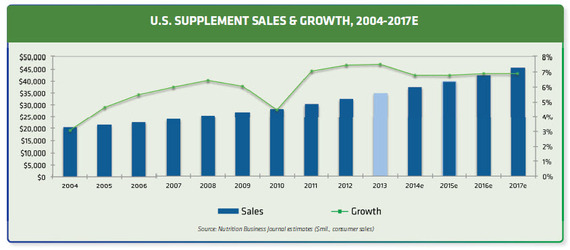Times are good for probiotics. Fatty acid supplements -- those derived from fish and krill oils -- are struggling. Sports nutrition is on an upward trend (and has been for several years). Weight loss supplements -- Garcinia cambogia and green coffee beans in particular -- well, perhaps this category is best not mentioned right now. There is no escaping the fact that the dietary supplement industry has received a great deal of media attention over the past year. Much of this press has been negative, which is no doubt both confusing and troubling to a public that is seeking ways to stay healthy in a world facing a societal epidemic of chronic disease and personal disenchantment with today's medical treatment options, which often focus on treating the symptoms of illnesses rather than the core physiological imbalances that cause them.
In the July 2014 issue of the Nutrition Business Journal, journalists who exclusively cover the natural products industry tackle the harsh glare of the negative press head on. The cover story, titled "Supplement Industry Grows 7.5 Percent Despite Negative Media" and authored by Laurie Budgar, puts the bad news right on the table:
Last December, USA Today published a report linking the leaders of some companies making adulterated supplements to criminal pasts. That same week, the esteemed Annals of Internal Medicine published an extensive literature review, which culminated with the finding that 'limited evidence supports any benefit from vitamin and mineral supplementation for the prevention of cancer or [cardiovascular disease].' A scathing editorial accompanying the report admonished readers to 'stop wasting money on vitamin and mineral supplements.'
And yet, as the article goes on to point out and illustrates in the graphic below, sales of supplements -- while definitely responsive to the ebb and flow of the press and its impact on the marketplace -- have not bottomed out and in fact industry growth continues.
In an insightful editorial, NBJ Editor-in-Chief Marc Brush places himself in a dual role -- journalist and consumer -- and poses some very pointed questions to industry leaders (and I include myself in this group): "What is the 'real story' of dietary supplements we seem to perennially miss, get wrong, twist and obfuscate? Sales are strong, but do they feel strong? Or does the foundation upon which they stand feel a little too rickety? In 2014, why should I take dietary supplements?"
I'm in. Let's talk about it. I have been personal observer and a professional participant in the natural products industry since the 1970s. While its core reason for being -- the optimization of our personal health -- is strong, the culture in which that philosophy exists has grown crowded and complicated. In some cases, direct-to-consumer claims are excessive and products are not always safe. For me, sometimes the connection to "diet" or "food" has left the playing field entirely and has been replaced by energy drinks, sexual enhancement products, and anti-aging serums, all of which are far removed from anything that looks like food or its natural constituents, the foundation blocks upon which this industry is based. Where are the boundaries of what a natural product is or is not?
This year marks an important anniversary -- 20 years since the passage of the Dietary Supplement Health and Education Act (DSHEA) of 1994. To see our future more clearly, I think we need to take a quick look at our past. This industry got its true start some 80 years ago, mainly in Southern California. It was driven by a grassroots interest in things like organic agriculture and botanical medicine. In the second half of the 20th century, the main criticism levied against natural products and proponents of their use -- lack of scientific evidence -- began to be addressed by scientists such as Linus Pauling and Abram Hoffer, both of whom studied and documented what they called "orthomolecular" substances -- things that were natural to the human body that could correct certain kinds of metabolic disturbances.
Today, scientific research is the foundation for all of the reputable and leading companies in the natural products field. If science is the foundation, then two things -- quality and effectiveness -- are the pillars. It is here that we need to give a nod to DSHEA and acknowledge what has been accomplished in its first two decades since the law was enacted. In my opinion, DSHEA is about so much more than just regulating and labeling dietary supplements. It is about people aspiring to take charge of their health through implementation of strategic approaches toward diet, exercise, lifestyle, and environment. This was and is a movement with broad spreading implications beyond pills in a bottle or powder in a can.
What is the next step for the natural products industry? The interrelationship with health care at large is of critical importance. Chronic disease is rising on a global scale. Pharmaceutical drugs alone don't seem to solve these problems. We have to find new solutions. The challenge is upon all of us as we go forward to make this really stand up and be meaningful in reducing the burden of illness and improving people's ability to live long and healthy lives. The dietary supplement industry has the opportunity to be a leader in this needed transformation in the health care system. This will only happen, however, if it steps up to its responsibility to produce, market, and sell products that are supported by proof of effectiveness and safely, and authentically represent the remarkable discoveries that are being made in nutritional science.
Dr. Jeffrey Bland is the author of The Disease Delusion: Conquering the Causes of Chronic Illness for a Healthier, Longer, and Happier Life, published by HarperWave, a division of HarperCollins Publishers.
